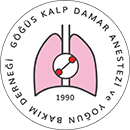

Impact of Platelet-lymphocyte and Neutrophil-lymphocyte Ratios on Postoperative Mortality After Coronary Artery Bypass Surgery
Elif Ertaş1, Burak Toprak2, Abdülkadir Bilgiç31Department of Biostatistics, Selcuk University Faculty of Medicine, Konya, Türkiye2Department of Cardiovascular Surgery, Mersin Cith Training and Research Hospital, Mersin, Türkiye
3Department of Cardiovascular Surgery, Mersin University Faculty of Medicine, Mersin, Türkiye
Objectives: Inflammation plays a crucial role in postoperative outcomes following coronary artery bypass grafting (CABG) surgery. Readily available hematological markers, such as the platelet-to-lymphocyte ratio (PLR) and neutrophil-to-lymphocyte ratio (NLR), have been increasingly recognized as indicators of systemic inflammation. However, their relationship with postoperative mortality in coronary artery bypass grafting (CABG) surgery remains uncertain. This study aims to evaluate the effect of postoperative PLR and NLR on mortality in patients undergoing CABG surgery.
Methods: This retrospective observational study included 470 patients who underwent CABG surgery between March 2020 and June 2022. Postoperative blood samples were analyzed to assess PLR and NLR levels. The primary outcome of the study was postoperative mortality. Logistic regression models were used to evaluate the association between these inflammatory markers and mortality risk.
Results: Preoperative PLR and NLR values were not significantly associated with postoperative mortality (p>0.05). However, postoperative NLR was found to be a significant predictor of mortality (p<0.05), with each unit increase in postoperative NLR correlating with a 1.05-fold increase in mortality risk (95% CI: 1.021.09). Although postoperative PLR levels were elevated, they did not show a statistically significant relationship with mortality.
Conclusion: This study demonstrates that postoperative NLR is significantly associated with mortality in patients undergoing CABG surgery, while postoperative PLR does not show a significant correlation. Regular monitoring of postoperative NLR may help identify high-risk patients early and enable timely interventions to improve outcomes. Given its accessibility and cost-effectiveness, incorporating NLR into routine postoperative monitoring could enhance patient management. Further multicenter studies are needed to validate these findings and refine the clinical implications of NLR and PLR in CABG patients.
Makale Dili: İngilizce

















